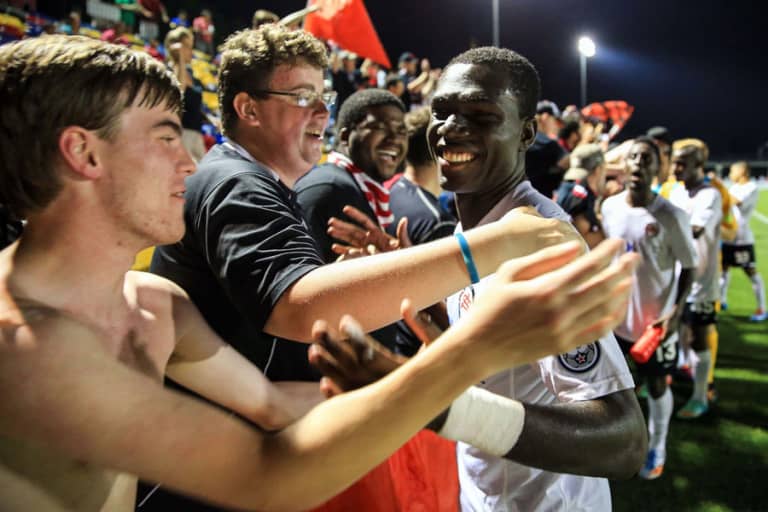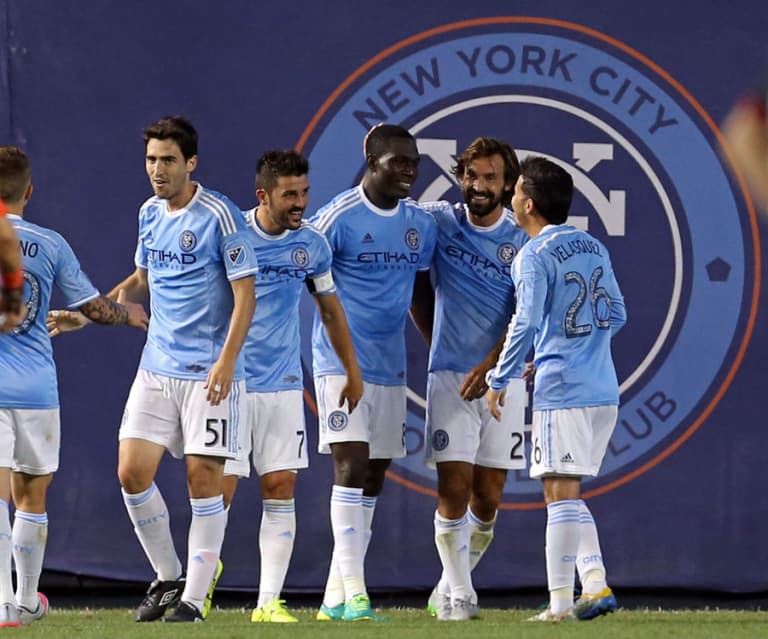The 1996 Mitsubishi sputtered, then stalled. Kwadwo Poku pulled over, turned on his emergency lights and took a deep breath.
He turned the key. Nothing. He tried again. Same result. He’d decided to make the trip in the middle of the night to avoid traffic, now the only lights on Interstate 40 came from his headlights piercing the darkness.
In the morning he was scheduled to train with the Carolina RailHawks and, if all went well, perhaps even sign his first professional contract. After two years of setbacks – the promise of college soccer dashed by lack of grades, money, or both, then professional ambition dulled by rejection – his dream felt so close.
Now, somewhere in rural North Carolina, Poku pulled out his phone and called the RailHawks’ coaching staff. No answer. He dared not wake up his mentor, Phoday Dolleh, or his aunt, uncle or girlfriend back in Tennessee with bad news at this hour.
So, after resolving to walk the three miles to the nearest gas station in the morning, Poku curled up in the back seat and came to terms with his luck. He wouldn’t make it to the tryout after all. With his student visa running out, the RailHawks had seemed like his final chance to avoid an empty-handed return flight to Ghana.
It all seemed like a cruel twist of fate, yet another opportunity just out of reach.
“I went back to Tennessee, and I told myself I’m done,” Poku says. “I’ve got to go back to Ghana.”

The Kumasi market. Photo via Wikimedia Commons
POKU'S STORY BEGINS in Kumasi, a sprawling, tropical metropolis 155 miles inland from the coastal capital of Accra.
The son of a professional soccer player, Poku enjoyed a comfortable life in Ghana’s second largest city, attending some of the top schools in West Africa and spending every available second – in parks, on the streets, with his school team – playing the national pastime.
He dreamed of following in the footsteps of his father, Kwabena Boateng, a two-way midfielder who played professionally in Ghana and neighboring Togo and, when he was back in Kumasi, dragged his son out of bed for early morning jogs that doubled as discussions about life and soccer.
In Poku’s teenage years, that dream seemed destined to become reality. He earned a spot in the academy of Ghana Premier League and African soccer powerhouse Asante Kotoko SC. The Ghana Under-17 national team even came calling.
But he also drew the attention of a local talent scout, who identified Poku as a future college star and convinced the University of Dayton to make the long trip to Ghana to scout him in person.
The Flyers’ staff liked what they saw, and although a few friends argued the national team setup provided a better path to a professional career, his mother Patricia’s wishes helped push the eldest of her four sons to America.
“My mom told me, ‘Get your education and get to play.'" Poku says. "'In the States, you have the best schools around.’”
On Nov. 19, 2010, three months shy of his 19th birthday, Poku landed in Nashville, Tennessee, where his aunt and uncle lived. The culture shock – like the frigid weather – took hold immediately.
His first day on American soil, left alone with his aunt and uncle at work, Poku went for his first cold-weather run.
“I came back and my nose and eyes were burning,” he remembers. “I felt like I was about to pass out. It was a hard feeling.”
DURING THOSE EARLY MORNING RUNS, Kwabena Boateng drove a bit of practical, if not prophetic, advice into his son: “Nothing will be easy.”
Poku would revisit those words often during his first two years in the US.
It turned out he didn’t have the SAT score needed to be academically eligible to compete in Division I. Dayton was out, for the time being.
Poku pivoted. He would attend Southern Polytechnic State University in Marietta, Georgia, close to where his mentor, Dolleh, lived. Once his transcripts were in order, it would be on to Dayton.
But the plan at SPSU hit a snag. The NAIA school consolidated with Kennesaw State University, and the men’s soccer program was among the casualties.
“I thought it was going to be amazing,” Poku says, “but it's not as easy as you picture it.”
With the clock ticking on his student visa, he found himself at a crossroads. Visits to schools up and down the East Coast – from St. John’s University in Queens to Georgia Military College and a few others in between – found no takers.
“Nothing was easy,” Poku says. “Every coach sees me and says, ‘You’re a good player, but this is hard, the [school] situation, money-wise.’”
With his collegiate future in flux, Poku became a part-time player and pick-up game regular.
He spent most of the year in Nashville with his aunt and uncle, often playing four games in a single day in local Spanish leagues for pocket change. During the week, he worked in construction, pouring foundations for new developments.
In the spring and summers, Poku competed with the Georgia Revolution in the National Premier Soccer League, living with the club's general manager, Rafe Mauran.
He still yearned to combine his athletic endeavors with higher education, but it became clear the only way to stay in the US legally was to abandon that dream for a more practical one.
“I was worried,” Dolleh remembers. “This is a kid who is a very good talent. I said our best thing is to try to go to the pro ranks. We can get a P-1 Visa, a work visa, and you can be right there.”
WITH COLLEGIATE OPTIONS EXHAUSTED, Dolleh scoured his address book for a connection that could help Poku live his dream – and stay in the US.
The most promising seemed to be former Honduras international and MLS midfielder Alex Pineda Chacon, who became head coach of the NASL's Atlanta Silverbacks in 2012.
As luck would have it, the Silverbacks were set to play the Revolution in the second round of the Lamar Hunt U.S. Open Cup that May.
With Chacon watching, Poku showed moments of dominance but missed a penalty kick as the Silverbacks escaped with a 1-0 victory. Dolleh pushed for a contract, but Atlanta were hesitant to sign an amateur.
“They were looking at big names," Dolleh recalls. “They brought some guy from South America, and they passed on Poku.”
Soon Chacon was out, and Brian Haynes was in as interim coach. Dolleh pitched the Silverbacks again. But again the club didn't want to take the risk.
Dolleh turned to the Carolina RailHawks, and Poku impressed head coach Colin Clarke in a trial. But when Clarke asked Poku to return to Carolina for a second time, his car broke down, and so did the opportunity. His American dream was turning into a nightmare.
Back in Nashville, his aunt, his girlfriend and Dolleh urged him to maintain faith.
“I wanted to leave, but I’m thinking of these people around me and they all wanted me to stay,” Poku said. “Those people kept me around.”
Dolleh went to the Silverbacks a third time, and was greeted by a new face: Eric Wynalda. Wynalda, a former US national team forward who played in Germany and MLS, was serving as the club’s technical director.
At Dolleh’s urging, Wynalda went to a Revolution scrimmage to see the mysterious prospect in person. That proved troublesome, though, when Wynalda got lost trying to find the field.
What he saw when he finally arrived changed both of their lives.
“After five minutes, I called Phoday and said, ‘Where has this guy played, where has he been and what’s his story?’” Wynalda remembers. “He just laughed. I said, ‘What does that mean?’ He said it’s complicated.”
Wynalda made a straightforward offer.
“I said, ‘If we can figure out how to get him on our books, he’s my highest paid player,’” Wynalda says.
Poku finally had the break he so desperately sought. He married his longtime girlfriend, an American citizen, obtained a green card and signed his first professional contact with the Silverbacks on Jan. 24, 2014.
“Eric was huge because he took the chance and a lot of people didn’t want to take that chance,” Dolleh said. “I always gave Eric that credit because he had guts to take that step.”

Kwadwo Poku shares a moment with Atlanta Silverbacks fans. Photo by USA TODAY Sports Images
ALMOST IMMEDIATELY, Wynalda began alerting MLS coaches to the Ghanaian midfielder he figured wouldn’t last more than a year in NASL.
Poku was raw and his best position was still a bit of a mystery, but once Atlanta allowed him to settle in as a second forward, he showed his game-changing quality.
In June 2014, ahead of a U.S. Open Cup clash against Western Conference powerhouse Real Salt Lake, Wynalda took Poku aside.
“This is the time. You have to show everybody you deserve to be here,” Poku remembers Wynalda telling him. “I know we’re not giving you a lot, we’re not giving you what you deserve, but these people are making three, four, 10 times more than you are making and I believe you are better than these people.
"I believe you can be there. There is no better time than this.”
A threat running at defenders the entire match, Poku broke the tie and sealed Man of the Match honors in second-half stoppage time. After finding space at the top of the 18-yard box, he rolled the winner inside the left post to claim a 2-1 victory over the MLS Cup runners-up.
“He’s got the ability to just change a game, to turn a game upside down, to be virtually unstoppable in certain moments in a game,” Wynalda says. “There are not very many Pokus for a reason."
Wynalda reached out to seven Major League Soccer teams to gauge their interest. All seven passed. The feedback that trickled back in shocked Wynalda.
“[One coach told me], ‘I’ve got to sign good players. I can’t afford to sign [crap] players right now,’” Wynalda says.
RSL's then-assistant coach, Jeff Cassar, and then-general manager, Garth Lagerwey, meanwhile, had seen Poku’s ability first-hand. But while Cassar was deciding whether or not to put in a discovery claim, Lagerwey left to become the president and general manager of Seattle Sounders FC and beat him to the punch.
Even though, he claims, it cost the Silverbacks a win, Wynalda sent Poku to Seattle for a trial in the middle of the NASL season.
Word from Sounders sporting director Chris Henderson, according to Wynalda, was that the visiting midfielder was inconsistent in training. Seattle was interested enough to put in a discovery claim to ward off other teams, but not interested enough to sign him.
Poku was disappointed, but undeterred. He wasn’t going to settle for the wrong opportunity.
“I felt like some teams are already built and it’s hard to get in, some places it feels like you’re not needed and it’s hard to get in,” he says now. “I wanted someone who believed in me, someone who knew who I was and what I was capable of doing to work with.”
That’s exactly what he got from Jason Kreis, the former RSL coach who was about to lead New York City FC into its first season.
“Jason Kreis gets a ton of credit here,” Wynalda says of NYCFC's inaugural coach, who was let go by the club in November. “Where a lot of other people were tripping on their feet, he moved. Without Jason making that call, I don’t know where Poku is today.”
But it wasn’t love at first sight. Kreis was far from sold when he watched Poku’s game tape.
“My initial reaction was I saw a player who seemed a little unmotivated,” Kreis says. “In a lot of matches he drifted in and out. I think it was obvious he needed a new challenge, but I needed to see his commitment level for myself.”
With Seattle’s permission, Kreis brought Poku in for a tryout in January 2015.
“From the first moment he was on the training field, I thought, ‘This is a special talent and a special potential,’” Kreis remembers.
Dolleh broke the news: NYCFC wanted him. The boy from Kumasi who grew up idolizing David Villa and Frank Lampard was set to share the field with his boyhood heroes.
He signed on January 23, calling his mother and father to share the news. Instead of returning to Kumasi for the first time in more than four years, he’d be preparing for his first MLS season.
“I was still in shock,” Poku said. “I kept telling myself, ‘This is a whole different level.’”
THIS WASN'T THE REVOLUTION. Or even the Silverbacks. Poku was star-struck from the very first fitness test.
Next to him, sweating through the same sprints, was Villa, who he and his brothers had watched lift trophies with Spain and Barcelona. A picture with the Spanish legend was quickly dispatched back to his jealous younger siblings.
In Manchester during preseason, Poku met Lampard, then sat down with boyhood idol, Ivorian and Manchester City superstar Yaya Toure, to discuss life in New York City and West Africa.
Seven years earlier, during the African Cup of Nations in Ghana, a star-studded Ivory Coast squad happened to be training at Poku's school. At the time, he had been happy just to get a glimpse of Toure. Now, they were sharing laughs, a reminder of how far he’d come and how far he still had to go.
Humble, polite and soft-spoken off the field, Poku showed an aggressive streak between the white lines once he finally found his feet with NYCFC in the summer, wowing fans with rumbling bursts up the middle, dagger-like cuts and a knack for making the right play in the final third. He scored his first goal in a 3-1 win over the Montreal Impact on June 13 and picked up three assists in his third start, a 5-3 win over Orlando City FC.
Still, Kreis was extra protective of the budding star, limiting him to just six starts and attempting to slow down the media and fan hype train building around the 23-year-old. Poku settled for a bench role, scoring four goals and setting up seven others in 27 appearances. He finished seventh in MLSsoccer.com’s annual “24 Under 24” ranking of the top young players in the league.
The likes of Villa, Lampard and Andrea Pirlo took note as well.
“Villa always believes in me, at practice or in the game, giving me signals to the sideline on what I have to do,” Poku said. “Frank talks to me and says, 'You need to get here, you need to find this, they can’t stop you.' … Pirlo tells me, 'You’ll get the ball more. I want you on the ball.'”

New York City FC's David Villa and Andrea Pirlo congratulate Kwadwo Poku on his goal against D.C. United at Yankee Stadium. Photo by USA TODAY Sports Images
“We want Poku! We want Poku!”
The chant became an every-game occurrence this season at Yankee Stadium, where Poku achieved cult-hero status after NYCFC fans latched on to his immigrant story, single-minded attacking play and gregarious personality.
A quiet giant who prefers a mellow night at home in White Plains to the hustle and bustle of the city, Poku opens up among fellow soccer fans.
“Sometimes I don’t know what to say, how to thank them,” Poku says. “I’m living the American dream, living something I’ve always wanted to live, to play professional soccer. If I was doing something outside of soccer, I don’t think I’d be happy like this.”
“It is a success story, but it could have been such a tragedy,” Wynalda says. “That’s the part that I think keeps him grounded, keeps him humble. He epitomizes that person who always remembers where they come from.”
Poku now wears a tangible symbol of his heritage over his heart as well.
Ghana coach Avram Grant monitored the NYCFC midfielder’s meteoric rise and included him in his side for a friendly against Canada in Washington, D.C., in October.
Poku was ecstatic about that opportunity, but he was most excited to return home to Ghana for the holidays. It’s been five long years since he’s seen his parents and his three younger brothers, and he spent November and December counting down the days until they reunite.
He left Kumasi dreaming of a new life in an unfamiliar land. He returns as a Black Star. Next time, perhaps he’ll be closer to his ultimate dream, walking in the footsteps of Toure or perhaps even Patrick Vieira, his new head coach at NYCFC.
“My goal is not just to be a player,” Poku says, “but that guy who you’re going to speak about for years and years and years to come.”
THE WORD is MLSsoccer.com's regular long-form series focusing on the biggest topics and most intriguing personalities in North American soccer. Check out THE WORD archive.












